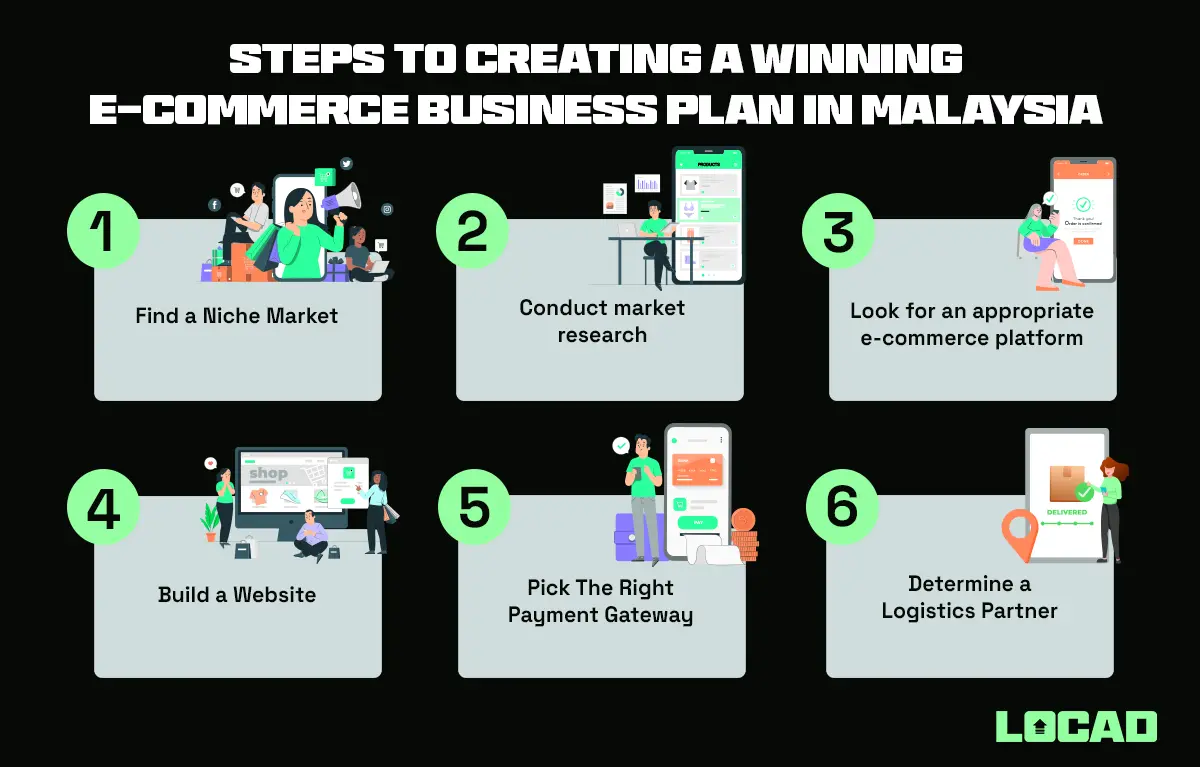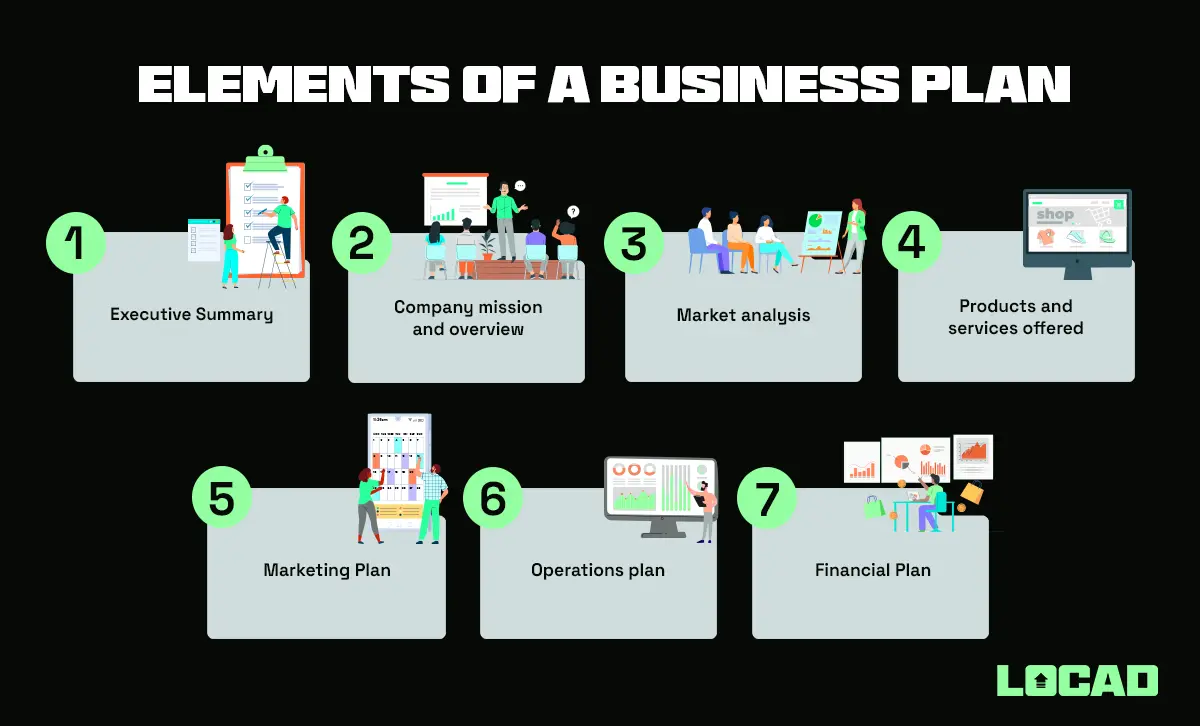In today’s digital age, e-commerce has emerged as a thriving avenue for entrepreneurs to establish and expand their businesses. However, venturing into a competitive landscape such as Malaysia requires more than having just a functional e-commerce website and product listings. A well-crafted e-commerce business plan that helps entrepreneurs align operations towards goals, weather market challenges and is crucial for online success.
This article delves into the fundamentals of creating such a plan, encompassing various key aspects. Here, we will explore the vital differences between a business plan and a business model, along with essential steps like identifying a niche market, conducting thorough market research, and selecting an appropriate e-commerce platform. Additionally, we will outline the critical elements of a comprehensive e-commerce business plan, ensuring you are well-equipped to embark on your digital retail journey.
What is an e-commerce business plan?
An e-commerce business plan is a comprehensive blueprint outlining the strategic direction and operational framework for an online retail venture. Tailored to the digital marketplace, it articulates the business’s mission, objectives, and strategies. This guiding document provides an e-commerce business owner in Malaysia with a clear overview of offerings, target market, marketing approach, financial projections, and operational logistics.
Crucially, it helps identify potential pitfalls, anticipate popular Malaysian market trends, and craft effective strategies for success. A well-structured plan enhances credibility from customers and investors alike and helps secure funding. Additionally, it is key to establishing internal coordination, streamlining decision-making, and aligning the team toward the shared objectives of the company. It is the foundation upon which successful e-commerce ventures are built, driving growth and opportunities in the digital realm.
Difference between a Business Plan and a Business Model
The distinction between a business plan and a business model lies in its scope and purpose. A business plan outlines the concrete and customised operational processes of an e-commerce venture. It encompasses detailed strategies, market analysis, financial projections, and implementation guidelines. For those looking to get started efficiently, Planwiz business plan templates can serve as a helpful tool to create a well-structured plan quickly.
On the other hand, a business model is a conceptual framework on which the business plan is built. It defines the core value proposition and revenue streams. In addition to this, a business plan aims at outlining the target market and key partnerships for a Malaysian business.
While the business plan delves into the specifics of execution, the business model provides the foundational logic and structure to ensure the e-commerce venture’s viability and success. Together, these elements form a cohesive strategy for growth and sustainability in the extremely dynamic digital landscape.

How to Create a Business Plan for Malaysia
Embarking on an e-commerce venture in Malaysia offers immense opportunities in a rapidly growing digital landscape. However, success in this dynamic market necessitates a well-structured and comprehensive business plan. In the forthcoming section, we will present a step-by-step guide to developing an e-commerce business plan tailored specifically for Malaysia. This guide will encompass key considerations and essential components necessary to create a robust and effective blueprint for your online retail journey.
Let’s dive into the process of crafting a winning e-commerce business plan for Malaysia.
Find a Niche Market
Identifying a niche market in e-commerce is crucial for success, enabling businesses to target specific audiences, tailor products, and establish a strong brand identity. Niche markets often have less competition, allowing businesses to position themselves uniquely and become authoritative players.
Conduct thorough market research by analysing trends, consumer demands, keyword search volumes, social media discussions, and industry forums. Consider of using advance strategies, buy niche edits to enhance your website’s authority in targeted areas. Survey potential customers and seek expert opinions to validate market potential and narrow down the best niche for your e-commerce venture.
Conduct market research
To succeed in the Malaysian e-commerce market, understand local target audience demographics, cultural nuances, and buying behaviours. This may include the dip in retail shopping post-pandemic or even the rising e-commerce penetration rate in Malaysia. Nevertheless, analysing market trends, such as mobile commerce growth, helps entrepreneurs stay ahead.
So, perform a comprehensive competitor analysis to gain a competitive edge. Identify gaps in the market and untapped opportunities to position your e-commerce business strategically and offer unique value propositions.
Look for an appropriate e-commerce platform
Choose the right e-commerce platform, such as Shopify, WooCommerce, or BigCommerce, based on features and customisation options that suit your business needs. Consider the following criteria when opting for an e-commerce site:
- Ease of use
- Scalability
- Pricing
- Customer support
- Integration with third-party tools
In addition to these criteria, evaluate the performance, loading speed, and mobile responsiveness of the platform for a smooth user experience.
Build a Website
Secure reliable hosting with optimal uptime and fast loading times. Choose a memorable domain name and set up branded email addresses to enhance credibility. A professional domain name adds credibility to your e-commerce business, while branded email addresses foster trust with customers compared to generic email services.
Pick The Right Payment Gateway
Payment gateways in Malaysia, such as iPay88, PayPal, and BillPlz, facilitate secure transactions between customers and e-commerce businesses, encrypting sensitive data during online purchases. Therefore, a business will have to choose a payment gateway that will fulfil the following basic criteria:
- Security
- Transaction fees
- Supported currencies
- Integration options
- Compliance with industry standards and regulations
Determine a Logistics Partner
Efficient logistics and order fulfillment are crucial for a successful e-commerce operation, ensuring timely and satisfactory customer experiences that foster loyalty and positive word-of-mouth. Evaluate logistics partners based on capabilities, coverage, reliability, and cost-effectiveness. Partner with a reputable and locally-oriented logistics provider like Locad for a competitive advantage and optimised last-mile delivery in the Malaysian market.
Experience fulfillment by Locad today!

E-commerce Business Plan Elements
An e-commerce business plan consists of a whole range of elements that come together to help create the foundation for a successful business venture. These include the vision, mission, financials, and more. Read along as we explore them below.
Executive summary
The executive summary serves as a condensed version of the comprehensive e-commerce business plan, highlighting its key elements and strategic direction. It provides readers with a quick understanding of the venture’s objectives, target market, unique value proposition, and financial projections.
The executive summary plays a pivotal role in capturing the attention of potential investors, stakeholders, and partners. Its succinct nature allows busy readers to grasp the essence of the business plan quickly, enticing them to delve further into the detailed document.
Company mission and overview
The company mission and overview articulate the core purpose, long-term vision, and values that guide the e-commerce venture. It outlines the problem the business aims to solve and the unique approach it takes to achieve its goals.
A well-defined mission and vision statement provides a clear direction and serves as a compass during decision-making processes. They align the team, foster a strong company culture, and reinforce the commitment to the venture’s overarching objectives.
Market analysis
The market analysis delves into the e-commerce industry, examining trends, market size, and growth potential. It analyses the target market’s demographics, preferences, and pain points. Furthermore, it assesses competitors, their strengths, weaknesses, and market positioning.
Through market analysis, businesses identify unmet needs and gaps in the market, uncovering opportunities to differentiate themselves. In Malaysia, e-commerce has seen double-digit sales increases over the past decade. This type of knowledge is invaluable for crafting compelling value propositions and strategies that resonate with the target audience.
Products and services offered
This section provides a comprehensive description of the products or services offered by the e-commerce store. It highlights the unique selling points, features, and benefits that distinguish the offerings from competitors.
In this section, businesses provide specific details about each product or service, showcasing their attributes, applications, and any complementary offerings. A clear understanding of the offerings helps potential customers make informed purchase decisions.
Marketing Plan
The marketing plan outlines a multi-faceted approach to reach the target audience, encompassing digital marketing, social media campaigns, influencer partnerships, SEO, and content marketing. It identifies the most effective channels to create brand awareness and drive customer acquisition.
Through targeted marketing strategies, businesses can effectively engage with their intended audience, build brand recognition, and establish a strong online presence. This section also addresses customer retention efforts to foster brand loyalty.
Operations Plan
The operations plan defines the essential processes and procedures involved in running the e-commerce business smoothly. It covers inventory management, order fulfillment, customer service, and the logistics involved in shipping and returns. Standard Operating Procedures or SOPs involved in these areas of e-commerce ensure consistency in operations and enable seamless coordination among different team members. Clearly documented SOPs optimise efficiency, reduce errors, and facilitate scalability as the business grows.
Financial Plan
The financial plan presents detailed projections of revenue, expenses, and profits over a specific timeframe. It includes a budget outlining planned expenditures and expected returns, enabling businesses to make informed financial decisions.
The financial plan also addresses the initial capital required to launch the e-commerce venture and outlines the strategies for achieving profitability. Additionally, it may include an exit strategy that outlines potential scenarios for investors or founders to exit the business.
How To Use Shopee Live Selling To Maximize Sales
Shopee Live, a livestream marketing feature, has become a game-changer, revolutionizing how e-commerce sellers connect with their audience. This interactive…
How Locad Can Help
In the ever-evolving landscape of e-commerce, a well-crafted business plan serves as the cornerstone of success. From identifying a niche market and conducting thorough market research to formulating effective marketing and operational strategies, each element contributes to a blueprint for growth and profitability.
And as an e-commerce logistics partner, Locad plays a crucial role in supporting businesses with efficient and reliable order fulfillment, optimising last-mile delivery for enhanced customer experiences. In a highly competitive market like Malaysia, you need multiple strategic warehouses and fulfillment centres to meet customers’ growing expectations. For emerging businesses, renting out entire warehouses is expensive. However, a 3PL like Locad and its scalable infrastructure help businesses with storing, picking, packing, shipping, and tracking shipments.
So, embrace the power of a comprehensive business plan and partner with Locad to navigate the complexities of e-commerce with confidence. Start building your path to success today!
Which e-commerce platform is best for small businesses in Malaysia?
Shopify and WooCommerce are popular choices for small businesses in Malaysia due to their user-friendly interfaces, scalability, and extensive app integrations.
How to register an e-commerce business in Malaysia?
Register your business with the Companies Commission of Malaysia, to obtain a business registration certificate. Check for additional licences or permits depending on your products or services.
Can a foreigner start an online business in Malaysia?
Yes, foreign entrepreneurs can start an online business in Malaysia. However, they may need to comply with certain regulations, obtain necessary permits, and consider the business structure.
Is e-commerce taxable in Malaysia?
Yes, e-commerce transactions in Malaysia are subject to the Goods and Services Tax (GST) or the Sales and Service Tax (SST) based on the business turnover threshold.












